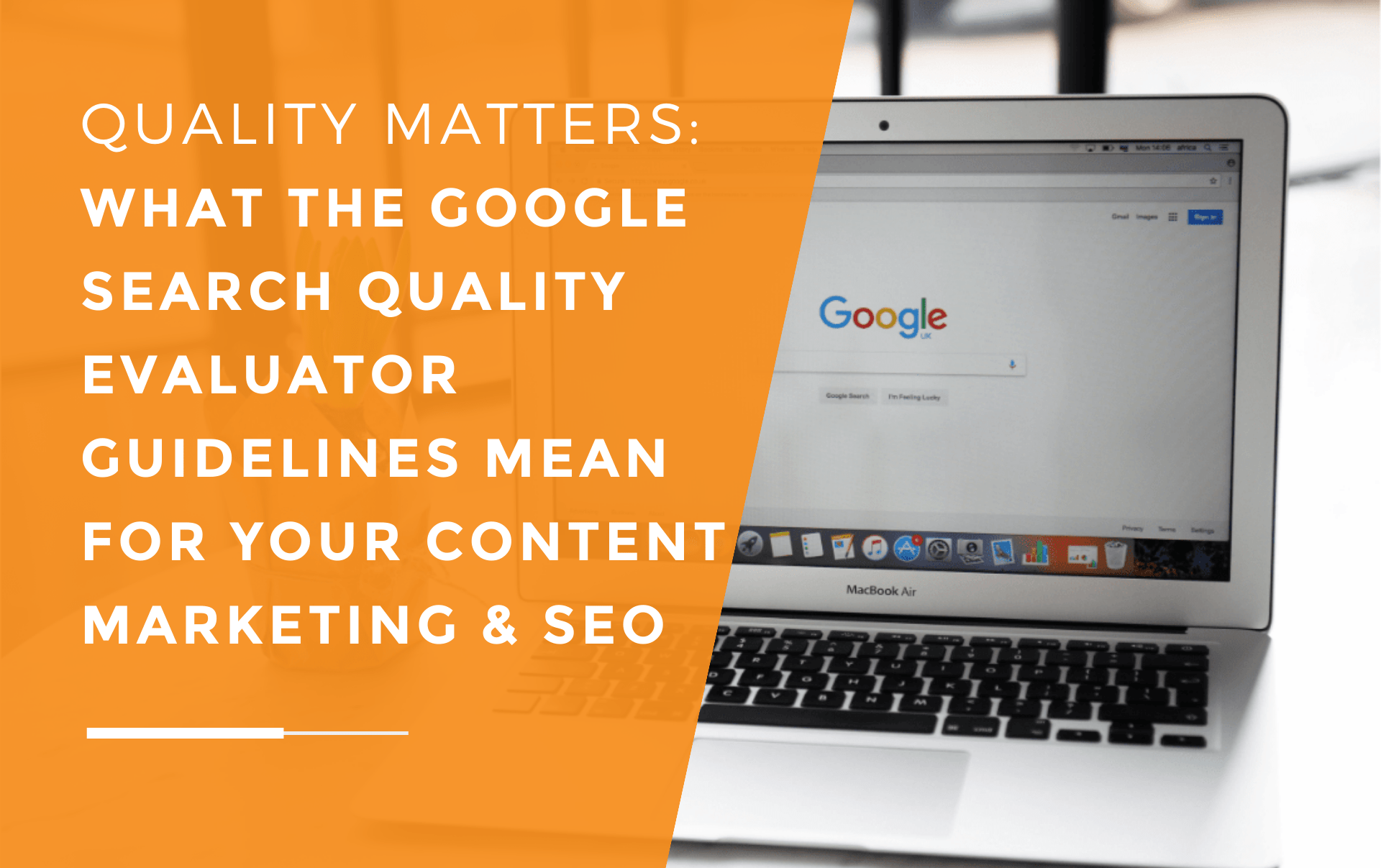The New War On Spam: What The March 2024 Google Core Update Means For Low Quality Content
by Will Williamson on 25-Apr-2024 11:48:00

Google algorithm updates aren’t always red-letter days. While the precise number isn’t known, there were at least 15 confirmed algorithm updates in 2022 and 2023, alongside 500 to 600 minor updates taking place each year.
Most of these involve minor, technical changes and bug fixes, but there are also significant, broader changes known as core updates that Google implements several times a year to enhance its search algorithms and system standards.
One of the most important of these core updates was Google Panda, which was launched in 2011 with the aim of filtering out low quality websites with plagiarised, duplicate, or poorly written content. Google Panda – named after Google engineer Navneet Panda who played a central role in developing Google’s search engine technology – set the tone for every core update published ever since: the primary purpose of the Google search algorithm is to reward high quality websites while reducing the presence of low quality sites on the search engine results pages (SERPs).
It’s A war On Spam That Continues To This Day.
Has it been successful? Overall, yes. The trend in content marketing from 2011 to 2023 was a year-on-year increase in quality and authority, favouring original, informative, and longer form content. The ultimate victors in the war on spam are businesses and their customers, lending greater credibility to the Google search engine and the results it provides.
So, What’s Changed?
The Google Core Update published last month (March 2024) is a wide-ranging algorithmic change that targets low quality and unoriginal content while rewarding more useful and relevant material. It’s a familiar theme, but this update is important because the core ranking factors used to prioritise websites in search results have been radically refined and expanded.
In particular, the core update implements new policies to combat AI generated spam, ‘spun’ content (where somebody uses an AI to create a multiple paraphrased version of the same blog article), and manipulative link signals (in SEO, this is a ‘black hat’ practice that includes using misleading anchor text, disguising URLs with unrelated text, and other tactics to artificially boost a website’s backlink profile).
Unfortunately, since the launch of ChatGPT in November 2022, the volume of new AI content being published has increased drastically, with approximately 10.2% of content on the Google top 20 containing AI generated material in March 2024.
Much of this material is decidedly lacking in the quality department.
Google’s recent action seeks to address quality concerns with AI generated content before it becomes a serious issue and undermines the credibility of the search engine.
What Does This Mean For My Business?
The update has already had a notable impact on many websites, and some have been de-indexed or had their search positions adjusted. Google’s new war on spam should be seen as a wake-up call for businesses to continue investing in high quality and relevant content as the best strategy to maximise their search position. There are, unfortunately, no shortcuts to the top. The best SEO strategy is to write for your customers, creating the best, most informative, and entertaining content you possibly can, in order to address their queries and drive inbound traffic to your site.
Is The Core Update A Ban On AI Content?
No. The core update doesn’t address AI specifically, but it does tighten up the rules on low quality content in a way that excludes a lot of shoddiest AI content. We’ve all seen this kind of content. It’s stuffed full of keywords and clichés, sounds stilted and unoriginal, and says the same thing over and over and over again. Websites that have gotten into the habit of churning out hundreds of AI generated articles each week over the past few years may need to think again. However, it’s important to remember that Google’s concern is quality – they don’t have a problem with AI itself. The best way to ensure strong long-term search visibility is to invest in professionally written marketing content tailored and personalised to your business. However, if you are going to use AI tools in your content, it’s essential to check that the content is original, factually correct and up to date, does not use copyrighted material, and is personalised to the needs and requirements of your target buyers. If you don’t, you could get penalised under the new rules.
Find Out More
To find out more about content marketing and how to create the best content for your business to support your growth objectives, please get in touch with one of our team today by clicking here.
Image Source: Canva- Inbound Marketing (SEO, PPC, Social Media, Video) (829)
- Strategy (368)
- Sales & CRM (195)
- Marketing Automation & Email Marketing (191)
- Business Growth (167)
- Website Design (161)
- Hubspot (138)
- Lead Generation (117)
- Google Adwords (99)
- Content Marketing (94)
- Conversion (53)
- Case Studies (47)
- News (47)
- Ecommerce (39)
- Webinars (35)
- SEO (26)
- AI (20)
- Events (19)
- LinkedIn Advertising (17)
- Video (17)
- Video Selling (15)
- Software training (13)
- Niche business marketing (11)
- The Digital Prosperity Podcast (10)
- Facebook Advertising (6)
- HubSpot Case Studies (5)
- January 2026 (7)
- December 2025 (15)
- November 2025 (6)
- October 2025 (17)
- September 2025 (16)
- August 2025 (14)
- July 2025 (14)
- June 2025 (5)
- May 2025 (19)
- April 2025 (15)
- March 2025 (13)
- February 2025 (13)
- January 2025 (8)
- December 2024 (2)
- November 2024 (4)
- October 2024 (21)
- September 2024 (4)
- August 2024 (8)
- July 2024 (14)
- June 2024 (16)
- May 2024 (25)
- April 2024 (15)
- March 2024 (18)
- February 2024 (5)
- January 2024 (10)
- December 2023 (6)
- November 2023 (10)
- October 2023 (13)
- September 2023 (12)
- August 2023 (14)
- July 2023 (13)
- June 2023 (14)
- May 2023 (15)
- April 2023 (13)
- March 2023 (14)
- February 2023 (13)
- January 2023 (15)
- December 2022 (13)
- November 2022 (6)
- October 2022 (8)
- September 2022 (22)
- August 2022 (15)
- July 2022 (13)
- June 2022 (16)
- May 2022 (14)
- April 2022 (16)
- March 2022 (17)
- February 2022 (11)
- January 2022 (8)
- December 2021 (6)
- November 2021 (7)
- October 2021 (11)
- September 2021 (10)
- August 2021 (7)
- July 2021 (7)
- June 2021 (4)
- May 2021 (4)
- April 2021 (1)
- March 2021 (3)
- February 2021 (5)
- January 2021 (4)
- December 2020 (7)
- November 2020 (6)
- October 2020 (5)
- September 2020 (9)
- August 2020 (18)
- July 2020 (17)
- June 2020 (17)
- May 2020 (10)
- April 2020 (21)
- March 2020 (24)
- February 2020 (21)
- January 2020 (12)
- December 2019 (23)
- November 2019 (12)
- October 2019 (14)
- September 2019 (16)
- August 2019 (15)
- July 2019 (13)
- June 2019 (6)
- May 2019 (8)
- April 2019 (4)
- March 2019 (2)
- February 2019 (2)
- January 2019 (2)
- December 2018 (3)
- November 2018 (24)
- September 2018 (11)
- August 2018 (9)
- June 2018 (3)
- May 2018 (6)
- April 2018 (14)
- March 2018 (12)
- February 2018 (16)
- January 2018 (15)
- December 2017 (15)
- November 2017 (18)
- October 2017 (23)
- September 2017 (19)
- August 2017 (28)
- July 2017 (27)
- June 2017 (25)
- May 2017 (18)
- April 2017 (17)
- March 2017 (16)
- February 2017 (17)
- January 2017 (14)
- December 2016 (21)
- November 2016 (27)
- October 2016 (25)
- September 2016 (16)
- August 2016 (20)
- July 2016 (19)
- June 2016 (14)
- May 2016 (20)
- April 2016 (24)
- March 2016 (22)
- February 2016 (28)
- January 2016 (27)
- December 2015 (28)
- November 2015 (19)
- October 2015 (9)
- September 2015 (12)
- August 2015 (5)
- July 2015 (1)
- June 2015 (10)
- May 2015 (3)
- April 2015 (11)
- March 2015 (14)
- February 2015 (15)
- January 2015 (12)
- December 2014 (2)
- November 2014 (23)
- October 2014 (2)
- September 2014 (2)
- August 2014 (2)
- July 2014 (2)
- June 2014 (7)
- May 2014 (14)
- April 2014 (14)
- March 2014 (7)
- February 2014 (2)
- January 2014 (7)
- December 2013 (9)
- November 2013 (14)
- October 2013 (17)
- September 2013 (3)
- August 2013 (6)
- July 2013 (8)
- June 2013 (4)
- May 2013 (3)
- April 2013 (6)
- March 2013 (6)
- February 2013 (7)
- January 2013 (5)
- December 2012 (3)
- November 2012 (2)
- September 2012 (1)
Subscribe by email
You May Also Like
These Related Blogs

Inbound Marketing, Online Advertising & SEO: JDR’s One Day Marketing Workshop
The JDR Group have once again joined together to host a One Day Marketing Workshop open to all our clients. The latest took place on Thursday 5th June …

A Brief History Of The Main Google Algorithm Updates – What's Next?
If you are in the SEO or online marketing world then you will be well aware that Google updates its search algorithm on a regular basis. Hundreds of t …

Quality Matters: What The Google Search Quality Evaluator Guidelines Mean For Your Content Marketing & SEO
In March 2024, Google updated its Search Quality Evaluator Guidelines to clampdown on “Untrustworthy Webpages or Websites” (p35, section 4.5). As the …




